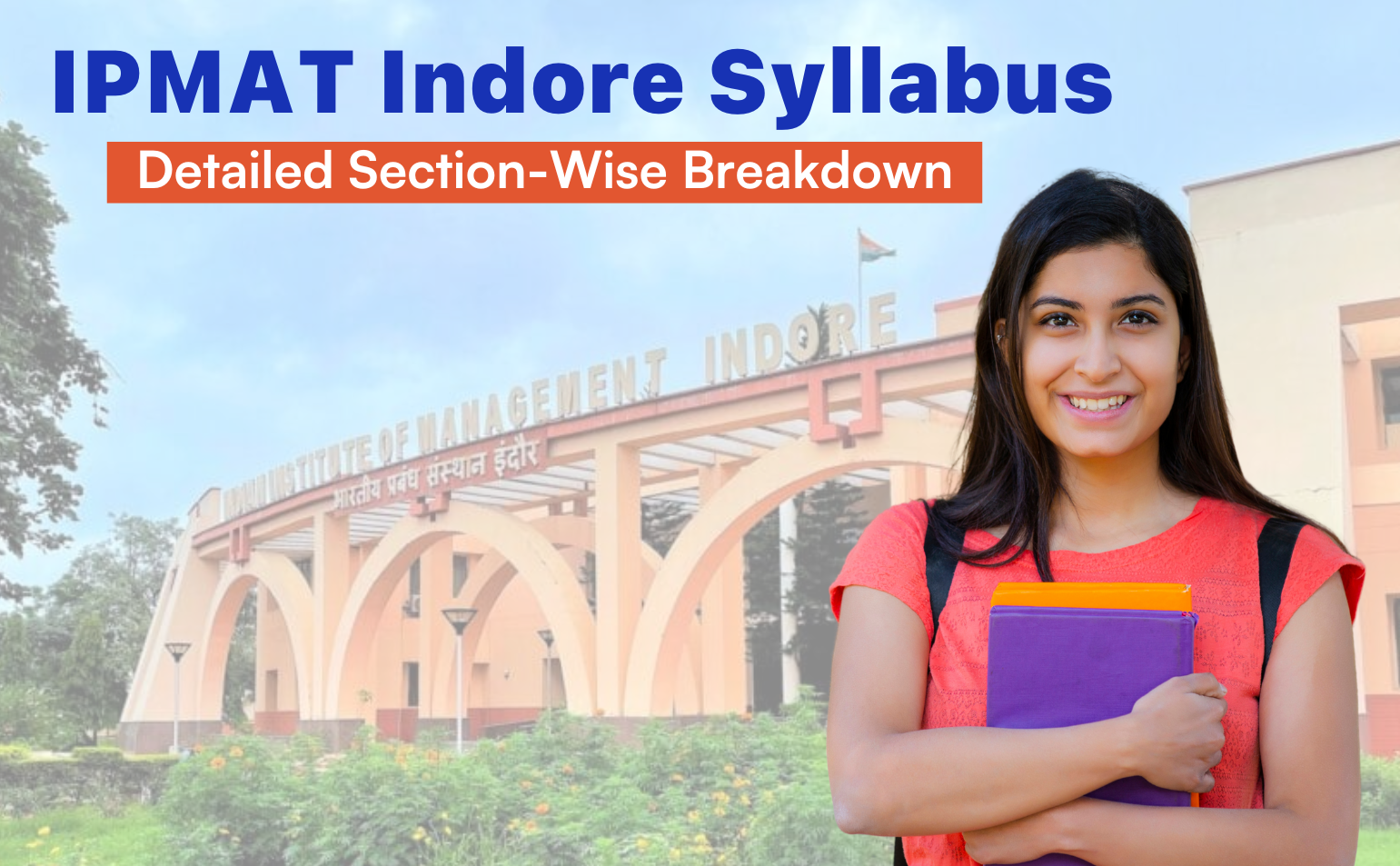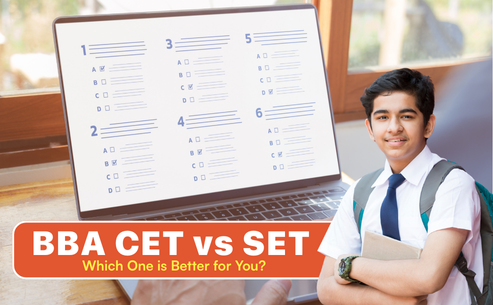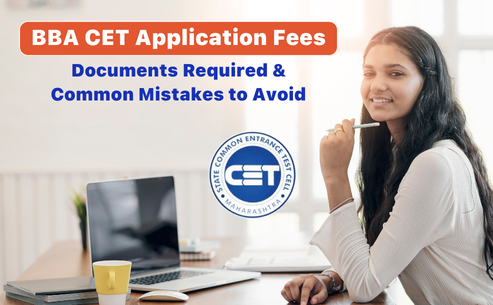The IPMAT Indore 2026 (Integrated Programme in Management Aptitude Test) is a gateway to one of the most prestigious management programs in India — the 5-Year Integrated Programme in Management (IPM) offered by IIM Indore. For students aspiring to secure a seat in this elite institution right after class 12th, cracking IPMAT is the first and most crucial step.
While many aspirants begin their preparation by collecting books and joining coaching programs, one often overlooked yet critical component is understanding the syllabus inside out.
Why is knowing the syllabus important?
Because it’s not just about studying hard — it’s about studying smart.
The IPMAT Indore syllabus is carefully designed to test a student’s quantitative aptitude, logical clarity, and verbal proficiency. However, unlike other BBA entrance exams, IPMAT Indore comes with its own unique exam structure — especially with its Short Answer (SA) section in Quantitative Aptitude.
This blog will offer you a section-wise breakdown of the IPMAT Indore 2026 syllabus, with insights into:
- Essential topics in each section
- Topic-wise weightage and difficulty level
- Common mistakes to avoid
- How IPMAT differs from other BBA exams
Whether you’re just starting your IPMAT journey or revisiting your prep plan, this guide will help you align your efforts with what truly matters.
Let’s dive in with the exam pattern first before we decode the syllabus in detail.
IPMAT Indore 2026: Exam Pattern Overview
Before diving into the syllabus, it’s essential to understand the structure of the IPMAT Indore 2026 exam. The exam is designed to assess students across three specific sections, each targeting different skill sets. It features a combination of multiple-choice questions (MCQs) and short answer (SA) questions—a format that sets it apart from other undergraduate entrance exams.
Here’s a quick overview of the latest exam pattern:
IPMAT Indore 2026 Exam Structure
| Section | No. of Questions | Time Limit | Type of Questions | Marking Scheme |
| Quantitative Aptitude (MCQ) | 30 | 40 minutes | Multiple Choice Questions | +4 for correct, -1 for wrong |
| Quantitative Aptitude (SA) | 15 | 40 minutes | Short Answer (No options) | +4 for correct, 0 for wrong |
| Verbal Ability (MCQ) | 45 | 40 minutes | Multiple Choice Questions | +4 for correct, -1 for wrong |
| Total | 90 | 120 minutes |
Key Highlights:
- The SA (Short Answer) section is unique to IPMAT Indore. It does not offer answer choices, which means there is no room for guesswork.
- Each section is time-bound, with no option to switch between them once the timer starts.
- Negative marking applies only to the MCQ sections. The SA section has no negative markings, making it a strategic opportunity to score.
Pro Tip: Manage time wisely and focus on high-accuracy attempts in MCQs to avoid losing marks due to negative marking.
Section-Wise Syllabus Breakdown
Quantitative Aptitude (MCQ)
The Quantitative Aptitude (MCQ) section in IPMAT Indore 2026 is designed to assess a student’s numerical problem-solving ability, mathematical reasoning, and conceptual clarity across a broad range of topics. It comprises 30 multiple-choice questions to be solved in 40 minutes — making speed and accuracy equally important.
Topics Covered in Quantitative Aptitude (MCQ)
Here is a detailed list of the most essential topics you must prepare:
| Topic | Sub-topics / Concepts |
| Number System | LCM & HCF, factors, remainders, base conversions, divisibility rules |
| Algebra | Linear & quadratic equations, identities, algebraic expressions |
| Arithmetic | Percentages, profit & loss, averages, ratios, mixtures, SI & CI |
| Geometry & Mensuration | Lines, angles, triangles, circles, polygons, surface area, volume |
| Coordinate Geometry | Distance formula, section formula, straight line, slope |
| Data Interpretation | Tables, bar graphs, pie charts, line graphs (basic calculations) |
| Permutation & Combination | Basic arrangements and selection principles |
| Probability | Basic probability concepts and formulae |
| Time, Speed & Distance | Relative speed, trains, boats, races |
| Time & Work | Pipes & cisterns, work efficiency |
| Set Theory | Venn diagrams, union-intersection concepts |
| Sequences and Series | AP, GP, nth term, sum of series |
| Logarithms & Indices | Laws of logs, exponential expressions |
| Functions | Types of functions, graphs, domain-range |
| Inequalities | Linear inequalities, quadratic inequalities |
Key Preparation Tips:
- Concept First, Speed Next: Focus on understanding the theory before drilling with speed-based practice.
- Sectional Mocks: Practice under 40-minute time limits to simulate exam pressure.
- Prioritize Arithmetic & Algebra: These form a significant chunk of questions and are relatively more scoring.
Sample Distribution (Estimated)
| Important Topics | No. of Questions |
| Number System | 2 |
| Arithmetic (Profit & Loss, SI/CI, Ratio & Proportion, Mixtures) | 4 |
| Algebra (Linear/Quadratic Equations, Functions) | 5 |
| Geometry & Mensuration | 1 or 2 |
| Permutation, Combination and Probability | 4 |
| Set Theory | 3 |
| Data Interpretation | 5 (in one set) |
| Matrices and Determinants | 2 |
| Total | 30 |
Disclaimer: Exact question distribution may vary each year, but this reflects general past trends.
Quantitative Aptitude (Short Answer – SA)
The Short Answer (SA) section of IPMAT Indore 2026 is what makes this exam truly unique. Unlike the MCQ sections, here, you are required to solve 15 questions in 40 minutes without any answer options. You must type in the exact numerical value — which eliminates guesswork completely.
This section tests the depth of understanding, precision in calculation, and clarity in application. Many aspirants often consider this to be the most challenging part of the paper.
What Makes This Section Different?
- No options = No guesswork
- Demands 100% accuracy — even a small calculation error costs marks
- No negative marking, so attempt all 15 questions
- Focuses more on core math fundamentals than shortcuts
Topics Covered in Quantitative Aptitude (SA)
| Topic | Key Concepts |
| Algebra (Advanced) | Quadratic & cubic equations, identities, factorization |
| Number System | HCF, LCM, highest power, digit-based problems, cyclicity |
| Geometry & Coordinate Geometry | Triangles, circles, coordinate plane, slopes, equations of lines |
| Functions | Domain, range, composite functions, piecewise functions |
| Sequences & Series | AP, GP, special series, sum of squares/cubes |
| Inequalities | Linear and quadratic inequalities, modulus-based problems |
| Logarithms & Surds | Properties of logs, simplification problems |
| Trigonometry (Basic) | Identities, heights & distances (very basic application) |
| Time-Speed-Distance | Conceptual and tricky questions with hidden variables |
| Miscellaneous | Higher-order puzzles, logical math scenarios, pattern recognition |
Key Preparation Tips
- Practice with Precision: Since there are no options, your calculation must be error-free.
- Work on Presentation: Get used to expressing your solutions cleanly in rough sheets.
- Prioritize High-Weight Topics: Algebra, Geometry, and Number System dominate.
- Attempt All Questions: No negative marking — make educated attempts even if unsure.
Estimated Topic-Wise Weightage
| Important Quant Topics | No. of Questions |
| Sequences & Series (AP, GP) | 2 |
| Algebra | 1 |
| Logarithm | 2 |
| Averages | 1 |
| Percentage | 2 |
| Probability & Venn Diagram | 2 |
| Ranking and Ordering | 4 |
| Total | 15 |
Although the difficulty level is higher, the absence of negative marking gives you a scoring advantage — provided you’re precise.
Verbal Ability (MCQ)
The Verbal Ability (MCQ) section of IPMAT Indore 2026 aims to assess your command of the English language, your comprehension of written passages, and your grasp of grammar and vocabulary. It is the most significant section in terms of question count, featuring 45 multiple-choice questions to be solved in 40 minutes.
This section rewards both natural readers and well-practised test takers. A mix of reading comprehension, grammar, and verbal logic ensures that your preparation must cover all aspects of the English language.
Topics Covered in Verbal Ability (MCQ)
| Topic | Key Concepts / Question Types |
| Reading Comprehension | Inference-based questions, tone, main idea, vocabulary in context |
| Para Jumbles | Sentence rearrangement for coherence |
| Sentence Completion | Fill in the blanks using contextual vocabulary |
| Error Spotting | Identify grammatical errors in sentence structure |
| Sentence Correction | Subject-verb agreement, modifiers, tenses, parallelism |
| Vocabulary | Synonyms, antonyms, one-word substitutions |
| Word Usage | Contextual application of similar words |
| Idioms & Phrases | Commonly used idiomatic expressions in context |
| Analogies | Word pair relationships |
| Cloze Tests (Occasional) | Fill in the blanks within a short paragraph |
Key Preparation Tips
- Read Daily: Editorials from newspapers like The Hindu or Indian Express improve comprehension and vocabulary.
- Grammar Practice: Stick to standard rules and revise regularly with practice exercises.
- Timed Practice: Attempt 45-question verbal sets within 40 minutes to improve pacing.
- Elimination Strategy: Use logic to eliminate incorrect MCQ options when unsure.
Estimated Topic-Wise Weightage
| Important Topics | No. of Questions |
| Reading Comprehension | 8 |
| Fill in the Blanks / Sentence Completion | 5 |
| Para Jumbles (Input the correct order) | 4 |
| Sentence Correction | 5 |
| Para Completion | 3 |
| Vocabulary (Antonyms-Synonyms, Idioms & Phrases, Foreign Words) | 10 |
| Grammar (Noun & Pronoun Errors, Subject-Verb Agreement, Prepositions & Conjunctions, Tenses, Modifiers & Parallelism) | 10 |
| Total | 45 |
RCs usually include 2–3 medium-length passages covering fiction, non-fiction, business, or abstract themes.
Syllabus Difficulty Level
Understanding the difficulty level of each section can give your preparation the direction it needs. Not all topics carry equal weight — some appear frequently, while others are rare but tricky. Similarly, some sections are speed-based, while others demand conceptual depth and calculation accuracy.
This section gives you a quantitative sense of which areas to focus on and how to prioritize your preparation accordingly.
Section-Wise Overview
| Section | No. of Questions | Time Allotted | Level of Difficulty | Remarks |
| Quantitative Aptitude (MCQ) | 30 | 40 minutes | Moderate to Difficult | Time-pressured; blend of logic + calculations |
| Quantitative Aptitude (SA) | 15 | 40 minutes | Difficult | Concept-heavy; no options; zero negative marking |
| Verbal Ability (MCQ) | 45 | 40 minutes | Easy to Moderate | High scoring; vocab and grammar-based |
| Total | 90 | 120 minutes | — | Sectional time limits; no switching allowed |
Difficulty Level Trends (Past 3 Years)
| Section | Difficulty Trend | Student Perception |
| Quant (MCQ) | Moderate → Tough | Trickier each year with tighter time limits |
| Quant (SA) | Consistently Tough | Challenging due to precision & concepts |
| Verbal Ability | Easy → Moderate | RCs are doable, grammar questions are scoring |
Conclusion: Focus more on accuracy in MCQs and conceptual depth in SA. Verbal can be your score booster with regular practice.
How IPMAT Indore Syllabus Differs from Other BBA Entrance Exams
While there are several BBA entrance exams in India, such as NPAT, SET, CUET, Christ University Entrance Test, and UGAT—IPMAT Indore stands out in both structure and difficulty level. Understanding these differences is essential for students who are preparing for multiple exams, as each test has unique priorities.
| Parameter | IPMAT Indore | Other BBA Entrance Exams (NPAT, SET, etc.) |
| Exam Conducting Body | IIM Indore | Universities/Private Institutions (e.g., NMIMS, Symbiosis) |
| Math Syllabus Level | Up to Class 11–12 (includes higher algebra, logs, functions) | Mostly Class 10 (basic arithmetic and algebra) |
| Short Answer (SA) Section | Yes (Quantitative) | No |
| Logical Reasoning Section | Not included | Yes, in most other exams |
| Verbal Section Level | RC-heavy, grammar + advanced vocab | Vocabulary-heavy, grammar + basic comprehension |
| Difficulty Level | Moderate to High | Easy to Moderate |
| Exam Design Focus | Conceptual clarity + precision | Speed and pattern recognition |
| Sectional Time Limits | Strict 40 mins per section | Some exams allow overall time for all sections |
| Negative Marking | Yes (MCQs only) | Varies (often none in exams like NPAT or SET) |
What This Means for Aspirants
- IPMAT Indore is the most academically rigorous among all BBA entrances.
- It requires deeper prep in core mathematics (functions, sequences, logs, inequalities).
- Unlike others, there’s no logical reasoning section, which can be a relief for some.
- The SA section adds a unique challenge that tests pure accuracy — no option elimination.
- RC and Grammar in IPMAT are more inference-based, not just factual or vocabulary-driven.
Strategic Tip for Multi-Exam Aspirants
“Don’t prepare for all exams equally — prepare for IPMAT like JEE Light, and the others will fall into place.”
If you target IPMAT Indore as your primary goal and prepare rigorously, exams like NPAT, SET, and CUET will feel more approachable with just some additional practice in logical reasoning.
Preparation Strategy Based on the Syllabus
Now that you’ve understood the exam pattern, syllabus, and how IPMAT Indore differs from other BBA entrance exams, the next step is to align your preparation with the demands of the exam. A scattered approach will not work here — what you need is a syllabus-smart strategy.
Section-Wise Strategy at a Glance
| Section | Focus Area | Approach |
| Quant (MCQ) | Speed + Accuracy | Regular topic-wise practice + sectional mocks |
| Quant (SA) | Conceptual Depth | Practice solving without options, develop error-free logic |
| Verbal Ability | Grammar + RC + Vocab | Daily reading, grammar rulebook revision, vocab builder |
Recommended Study Resources
| Subject | Books / Materials |
| Quantitative Apt. | – Quantitative Aptitude for CAT – Arun Sharma- NCERT Class 10–12 Maths |
| Verbal Ability | – Word Power Made Easy – Norman Lewis- Wren & Martin for Grammar- RC Passages (editorials, novels) |
| Mock Tests | – Previous Year IPMAT Papers- Sectional + Full-length IPMAT Mocks from coaching portals |
| SA Practice | – Solve without options using notebook & stopwatch- Focus on functions, logs, series |
Time Allocation Plan (for 4–6 months prep)
| Week Type | Quant (MCQ + SA) | Verbal Ability | Mock Tests & Analysis |
| Weeks 1–4 | Arithmetic, Algebra, Sets | Grammar, Vocab | 1 sectional mock/week |
| Weeks 5–8 | Geometry, DI, Functions | RC, Para Jumbles | 1 full mock/week |
| Weeks 9–12 | Sequences, Logs, Inequalities | Mixed grammar & RC | 2 mocks/week + analysis |
| Final 4–6 weeks | Mixed Revision + SA focus | RC + Grammar polish | 3 mocks/week + error tracking |
Preparation Dos & Don’ts
| Do | Don’t |
| Practice SA questions regularly — no guessing here! | Don’t rely solely on MCQ strategies — SA section is precise |
| Read editorials for RC + vocab simultaneously | Don’t skip grammar — easy marks lie here |
| Take timed mocks and analyze them thoroughly | Don’t take mocks without reviewing mistakes |
| Revise formulas and shortcut techniques weekly | Don’t postpone weaker topics like Logs or Functions |
“Your score depends less on how much you study and more on what you choose to focus on.”
Common Mistakes Students Make Regarding the Syllabus
Even with the best intentions, many IPMAT aspirants waste precious time and effort by falling into avoidable traps during preparation. Recognizing these common mistakes early can give you a competitive edge and help you stay laser-focused on what actually matters.
Top Mistakes and How to Avoid Them
| Mistake | Why It’s a Problem | What You Should Do Instead |
| Focusing only on MCQs and ignoring SA section | SA has 15 high-weight questions with no options — requires practice | Dedicate regular time to solving SA-format questions |
| Underestimating basic grammar and vocabulary | Grammar-based questions carry 20+ marks in verbal | Practice grammar rules, revise vocab regularly |
| Memorizing formulas without understanding their application | Leads to panic during conceptual questions | Understand the “why” behind formulas and practice variations |
| Ignoring reading comprehension because it’s “subjective” | RCs contribute up to 20–25% of Verbal marks | Practice RC daily from editorials, novels, or mock papers |
| Preparing only with Class 10-level math books | IPMAT covers Class 11–12 topics like Logs, Functions, Sequences | Include NCERTs or higher-level quant material in your plan |
| Avoiding difficult topics like logs, functions, or coordinate geometry | These appear regularly in SA and MCQ sections | Break them into subtopics, master one concept at a time |
| Jumping straight into mock tests without concept clarity | Leads to poor scores, low confidence | First complete 70–80% syllabus with clarity, then begin mocks |
| Not analyzing mock tests post-attempt | Repeating the same mistakes lowers improvement rate | Spend at least 1.5x the test duration reviewing your attempt |
Bonus Tip: Track What You’ve Covered
Create a syllabus tracker with three columns:
✅ Done | ⚠️ In Progress | ❌ Yet to Start
Update it weekly — it builds accountability and gives direction.
“The syllabus doesn’t fail you — it’s how you manage your syllabus that does.”
Downloadable Syllabus PDF
Don’t want to scroll through the entire blog every time you revise? We’ve got you covered.
Download the complete, updated IPMAT Indore 2026 Syllabus PDF – compiled by experts at Tarkashastra to give you a crisp, structured view of all essential topics, section-wise weightage, and key preparation tips.
What You’ll Get Inside the PDF:
- Detailed syllabus for Quant (MCQ + SA) and Verbal Ability
- Section-wise topic breakdown with subtopics
- Estimated question distribution from past trends
- Important prep tips, do’s & don’ts
- Ideal for print, mobile & offline reference
Download Now
Click here to download the IPMAT Indore 2026 Syllabus PDF
Tip: Print and pin it to your study wall for quick tracking and motivation.
Conclusion
Cracking IPMAT Indore 2026 requires more than just hard work — it demands clarity, structure, and a brilliant game plan. With a well-defined syllabus covering both MCQ and Short Answer formats in Quant and a comprehensive Verbal Ability section, this exam tests both depth and versatility.
By now, you’ve seen that:
- The syllabus goes beyond Class 10 basics, especially in math
- Each section is unique in its approach, timing, and question type
- A focused, syllabus-aligned strategy can help you avoid common pitfalls
At Tarkashastra, we don’t just teach—we mentor. We guide students to decode the pattern, master every section, and maximize their scores using proven techniques and mock drills tailored for IPMAT Indore.
Remember: The syllabus isn’t meant to scare you — it’s meant to show you where to aim.
Ready to take the next step?
Join our IPMAT Indore 2026 Program
Let’s turn your dream of IIM Indore into a well-planned, well-prepared reality.
IPMAT Indore Syllabus 2026 FAQs
1. What are the sections in the IPMAT Indore 2026 exam?
The exam consists of three sections: Quantitative Aptitude (MCQ), Quantitative Aptitude (Short Answer), and Verbal Ability (MCQ). Each section is timed separately and tests different skill sets.
2. What is the syllabus for IPMAT Indore Quantitative Aptitude (MCQ)?
It includes topics in Arithmetic, Algebra, Geometry, Number Systems, Set Theory, Data Interpretation, and Probability—mostly concepts from Classes 10 to 12.
3. What is tested in the Quantitative Aptitude (SA) section?
The SA section focuses on deeper math concepts like functions, sequences, logarithms, inequalities, and coordinate geometry. You have to type in exact numerical answers — no options are given.
4. How is the Verbal Ability section structured?
This section includes Reading Comprehension, Grammar, Sentence Correction, Para Jumbles, Vocabulary, and Cloze Tests. It tests your overall command of English usage and comprehension.
5. Is Logical Reasoning part of the IPMAT Indore syllabus?
No, Logical Reasoning is not included in IPMAT Indore. Unlike other BBA exams like NPAT or SET, this exam focuses more on math and verbal reasoning.
6. Does the exam include Class 12 math topics?
Yes, especially in the Short Answer section. Topics like sequences and series, functions, and logarithms are often picked from Class 11 and 12-level math.
7. Is there a negative marking in IPMAT Indore?
Yes, there is a negative marking of -1 for every incorrect answer in the MCQ sections. However, the SA section has no negative marking, which makes it a scoring opportunity.
8. How many questions are there in each section?
There are 30 questions in Quant (MCQ), 15 in Quant (SA), and 45 in Verbal Ability, for a total of 90 questions across all three sections.
9. What is the total duration of the exam?
The exam lasts 120 minutes, with 40 minutes allotted per section. Each section is time-locked, and you cannot move back once it’s over.
10. Can I switch between sections during the exam?
No, you cannot switch between sections. Once the timer starts for a section, you must complete it before moving to the next — and there’s no going back.
11. Are calculators allowed in the IPMAT exam?
No, calculators and other electronic devices are strictly prohibited. You must perform all calculations manually on the provided rough sheet.
12. Are Reading Comprehension passages long?
They are medium in length, usually between 300 and 450 words. Each passage is followed by 4 to 6 questions that test inference, tone, vocabulary, and main idea.
13. How essential is vocabulary for IPMAT Verbal Ability?
Vocabulary is crucial, especially for questions on synonyms, antonyms, idioms, and one-word substitutions. Around 8–10 questions are directly vocab-based.
14. What is the level of math difficulty in IPMAT Indore?
The difficulty ranges from moderate to high. While some questions are based on Class 10-level math, many—especially in the SA section—involve Class 11–12 concepts.
15. Is grammar still essential even with long RC passages?
Absolutely. Grammar questions based on sentence correction, error spotting, and fill-in-the-blanks form a significant chunk of the verbal section and are usually scored.
16. What is the format of Short Answer questions?
Short-answer questions do not provide options. You must solve the question entirely and type in the exact numeric or word-based answer — precision is key.
17. How often does the syllabus change?
The core syllabus remains stable primarily from year to year. However, the exam pattern and topic weightage may vary slightly, so staying updated through mocks and past papers is essential.
18. Can IPMAT Indore Prep help with other BBA entrance exams?
Yes. Since IPMAT prep includes advanced quantitative and verbal topics, you’ll find exams like NPAT, SET, and CUET easier to compare, especially with a bit of LR practice.
19. Are coaching classes necessary to complete the syllabus?
Not necessarily, but structured guidance can make preparation more efficient. Coaching helps you stay consistent, clarify doubts, and prepare strategically with mocks and analysis.
20. Where can I download the complete syllabus PDF?
You can download the complete IPMAT Indore 2026 syllabus PDF curated by Tarkashastra from this link. It includes section-wise topics, weightage, and tips for each area.







